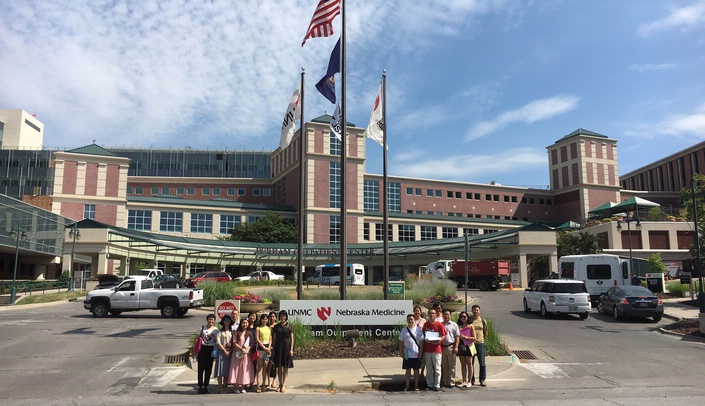For the second year in a row UNMC is host to a special group of faculty from universities in the middle and western regions of China. These faculty are here to observe UNMC’s medical education system. Last year the faculty trainees observed courses in the College of Medicine and saw how UNMC faculty use small group discussions, problem-based and peer-assisted learning, and competency-based learning concepts.
The trainees hope to learn new techniques that they can transfer to their classrooms and teach others in their home institutions.
Last year there were around 50 applicants from six provinces for 30 slots in the program. This year there were 100 applicants from twelve provinces for 30 slots.
One reason for the interest in this program is that there are few opportunities for faculty at universities and teaching hospitals in the middle and western regions of China to learn new pedagogical techniques.
Further interest was spurred on by China’s medical reforms. As Aiming Liu, PhD, associate professor at Ningbo University, explains, "China is building a new residency program administratively enforced by the central government. And, at the same time, many medical educators are reforming their strategies and concepts to improve teaching quality."
Zenghan "Hannah" Tong, PhD, assistant director of the Asia Pacific Rim Development Program says that word of mouth is also important. "We have had a number of faculty apply from the same university. Graduates from the program return to China and introduce their colleagues to a new teaching method in a presentation or teaching demonstration. When asked, they say, ‘I learned that at UNMC.’ It creates interest in the program amongst their colleagues. Additionally, it helps promote the high quality of teaching at UNMC in China," she says.
The trainees’ goals for their visit are varied.
Chanjuan Zhao, an instructor at Hainan Medical University in Haikou, wants to improve her teaching overall. "I’m always looking for some effective teaching methods so my students will say that the lesson was interesting. And once they graduate from medical school, they’ll remember and use what I have taught," she says.
Yanwu Ling, associate professor of anatomy from Youjiang Medical University for Nationalities, hopes to integrate system anatomy and regional anatomy courses at his university.
Yan Lin, PhD, a radiologist at the 2nd affiliated hospital of Shantou University Medical College, wants to learn more about assessment. "In my point of view, how to assess a student’s performance and provide them with effective feedback is the most difficult portion of medical education. I hope I can learn more assessment tools while at UNMC, so I can convey effective feedback and promote student learning when I return to China."
The trainees arrived before fall classes began so they could attend lectures about UNMC’s medical education and tour various facilities on campus. Once students return to campus, the trainees will observe classes. Last year the trainees left before the end of the semester, so they were unable to see exams and assessments in person. This year the faculty trainees are here for six months so they can see a whole semester of education.
Though classes have not yet begun, the trainees are already impressed with UNMC faculty. Dr. Liu says, "All of us feel the strong willingness of faculty at UNMC to dedicate themselves to education, and we have been impressed by their cooperation in this endeavor." Ms. Zhao echoed this, "I am most impressed by the statement ‘teach as a team so students’ interests come first. Teach medical students to be a team so the patients’ interests come first.’ "
This program is a collaboration between UNMC and the China Scholarship Council aimed at improving medical education in China.
